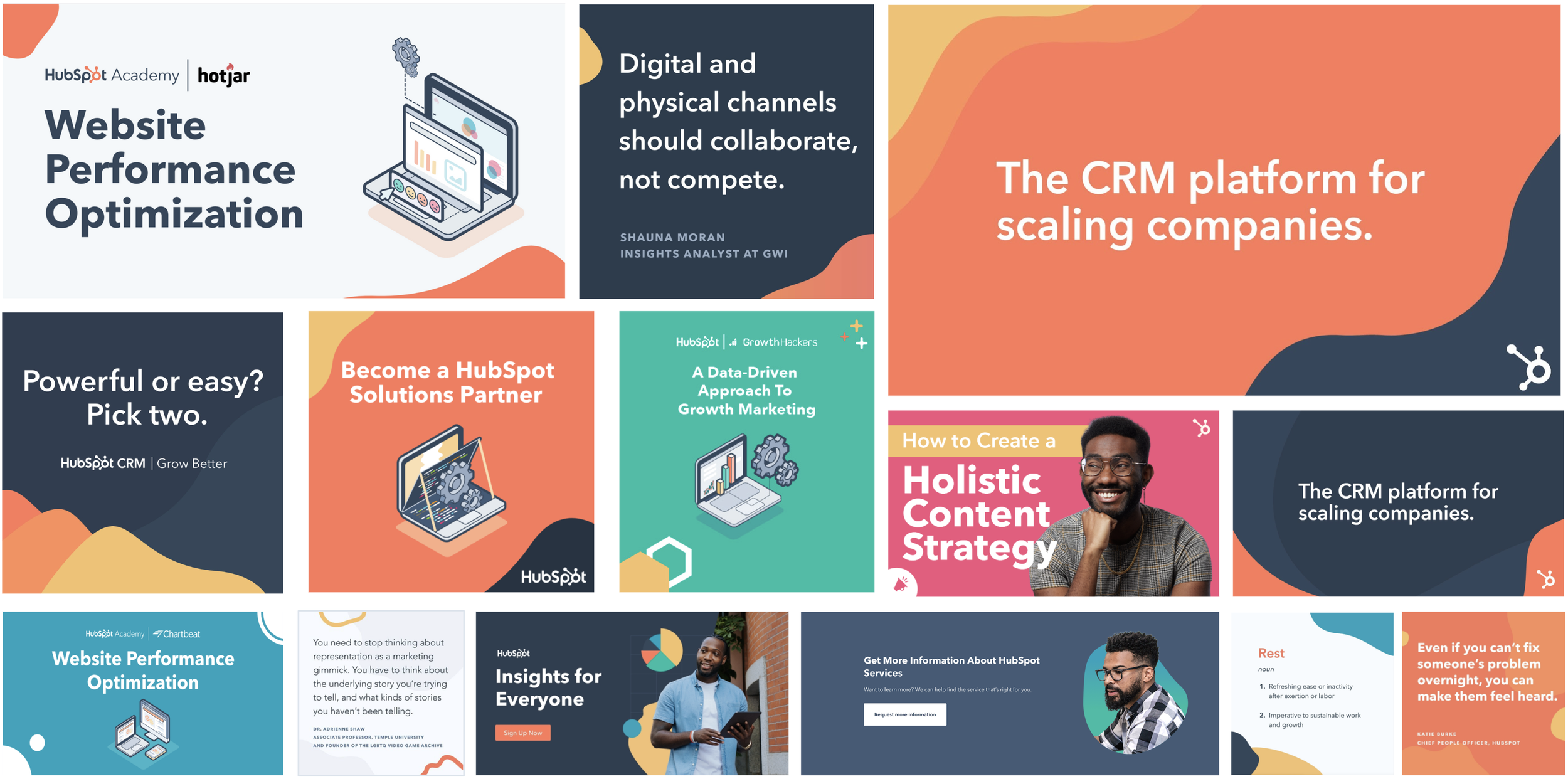The process for updating the visual identity began with the creation of HubSpot’s new brand positioning. The Brand Marketing and Creative Teams partnered up to define our positioning in the larger market, and how we could best differentiate ourselves amongst competitors like Salesforce. The results were clear: the market was dull, sterile, and prioritized numbers over people. Disconnected CRM solutions made business software impersonal, and a drag to use. HubSpot shines brighter than our competitors as a vibrant, joyful, human-centered alternative. This ultimately became our north star:
In a sterile sea of blue CRMs, HubSpot is a vibrant and human brand.
Let’s be clear: our usage of the word refresh over rebrand is very intentional. Our goals were to upgrade the existing toolkit - not reinvent the entire system. Hopefully, the visuals look familiar, but elevated. This helped HubSpot maintain the brand recognition we’ve gained over the years, and lightens the burden of updating literally hundreds of thousands of assets. Both old and new could live in harmony while the company makes the transition.
To support this transition, we created hundreds of ready-to-use templates across Canva, Google Slides, video, and one-pagers, equipping teams with the tools they needed to bring the new look to life quickly and confidently. The result: seamless adoption and a consistently polished brand experience across every touchpoint.
To hone our differentiators, the team focused on increasing vibrancy - trading our soft palette for one that makes a bold statement. Additionally, core issues, such as poor contrast between certain shades, lack of accessibility, and underwhelming depth of neutral shades, have been redressed. The end result is an elevated palette that lives comfortably next to the old, lending flexibility to teams where immediate transition is not an option.
With typefaces, the team concentrated efforts on discovering a similar, but more functional replacement to Avenir Next. After rigorous technical testing, the team selected Lexend Deca to serve as our tried and true, legible sans serif. But we didn’t stop there. To lean into our differentiators, the team selected a more stylistic serif typeface, to add contrast and personality. We’re pleased to introduce Queens, a bold statement typeface, for limited use in large headers.
For shape language and illustration, the team pulled in inspiration from mid-century modern design, with a new vibrant and HubSpotty twist. Simple shapes and clean lines paired with vibrant and bold human expressions bring a visually striking art direction to replace HubSpot's former blobs and waves. The new direction is eye-catching and confident. It’s a modern direction with nods to classic and timeless design.
And where would we be without our customers? The brand refresh also updated our photography style to bring more unique, human expressions to our content. The team leaned into a direction that is simple but bold. Photos use rich and vibrant colors but monochromatically or with limited colors. In the end, it's the personalities, expressions, and diversity of the models that's the central feature.
Before
After
HubSpot Brand Refresh
Role: Creative Director
In 2022, HubSpot’s internal creative team embarked on a bold mission: to transform into a vibrant, joyful, and distinctly human brand amidst a landscape of sterile, blue corporate alternatives. Our comprehensive rebrand was a collaborative effort between brand strategists, designers, animators, web developers, and copywriters who reimagined HubSpot's identity from the ground up.
The initiative delivered a complete brand overhaul, beginning with new positioning and strategy that cascaded into refreshed a color palette, typography, shapes, and illustrations. Drawing inspiration from mid-century design principles, we embraced simple geometric forms and bold color choices while prioritizing function over unnecessary embellishment. This aesthetic perfectly embodied HubSpot's commitment to providing a clean, intuitive, fuss-free, and human-centered CRM experience.
Color Palette
Issues with old palette:
Muted color
Lack of contrast between colors
Inaccessibility of most colors
Color vibration
Lack of tie to brand strategy
What we changed:
More vibrant versions of each color
Increased contrast between colors
Increased light and dark options for accessibility
Better pairing of colors to reduce vibration
Clearer tie back to HubSpot brand strategy
Photography
Issues with old photography:
Not ownable to HubSpot; looks like every other software company
Looks too much like stock photography
Not enough personality / too posed
No reference back to broader brand identity
What we changed:
Better connection to brand strategy as a vibrant and joyful brand
Increased forms of diversity and inclusion
Better showcase of individual personalities and human expressions
Updated vibrant color backdrops to align with rest of brand identity
Shape Language
Issues with old shapes:
Lack of strategy or reason
Too organic and soft
Playful and childish
Not suited for animation
Basically limits us to one shape
What we changed:
Better tie back to brand strategy
Cleaner, bolder shapes
Better suited for an upmarket audience
Better flexibility for animation
Variety of shapes for diverse compositions
Illustration
Issues with old illustrations:
Not easily replicable
Not suited for animation
Not fit for small scale
Not ownable by HubSpot
Designed for product, not brand
What we changed:
Better tied to overall art direction
More scalable for other illustrators to replicate
More ownable in comparison to other tech companies
Better flexibility for animation
Typography
Issues with old typography:
No serif to pair with
Low contrast in weights
Poor kerning
Poor x-height
OS incompatibility
Poor legibility
Poor relationship with foundry
What we changed:
Inclusion of new serif for large headlines
Increased testing to select sans serif based on performance and legibility
Open source font with variable option











